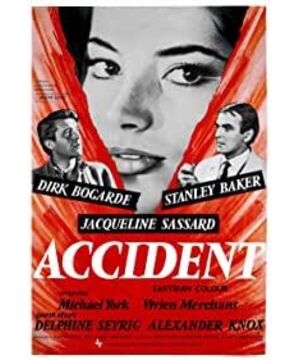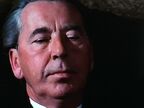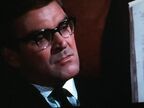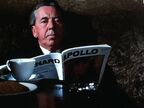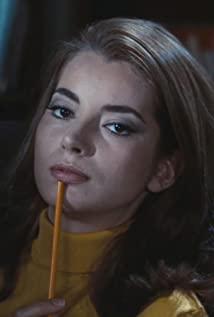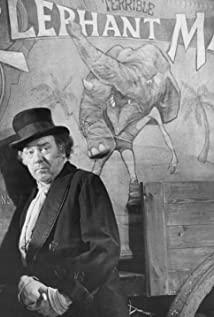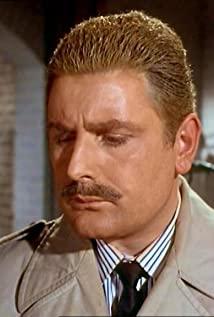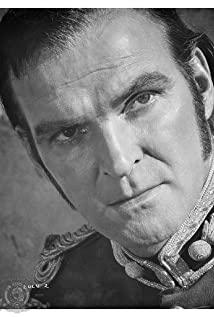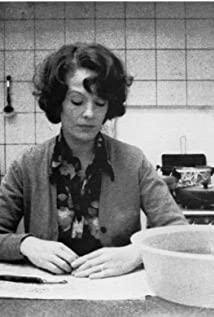(15/01/2022) Cinémathèque, Joseph Losey retrospective. Screening of Car Crash, followed by a presentation by Michel Ciment, moderated by Frédéric Bonnaud. Just a quick note of some of what Michel Ciment said. Not the words, but the meaning. The content in parentheses comes from myself.
About Rossi's life
Having made some crime films in the United States, and his career was on the rise, he was threatened by McCarthyism: when he was filming in Italy in 1952, the U.S. House of Representatives asked him to appear in a hearing, generally speaking, he was asked to explain what he did, Indicting fellow Communists. Rossi refused to obey and fled to England. During his time in the UK, he made several films, which were gradually praised by critics, especially in France. In the 1960s and early 1970s, several of his films with Harold Pinter (The Servant , this one, and The Emissary ) completely established him as a great director.
Rossi's relationship with the film critics is also interesting. When he was not recognized as a master at the beginning, some film critics in France were particularly optimistic about him, and his first few British films ("The Years Are Ruthless", "Prisoner in Prison", etc.) were well received by these people. But no one in Britain looked up to him. The filmmakers of the Free cinema movement (Lindsay Anderson, Karel Reisz, etc.), who are also concerned with social reality and trying to revolutionize British cinema, hardly ever mention Rossi... His three works with Pinter finally set him up in one fell swoop Master status. He is also someone who cares about his reputation, has followed fashion, and tried many other things, some of which were unsuccessful. Michel Ciment said that he liked Rossi very much, but also admitted that not every choice Rossi made was right. For example, he cooperated with Jorge Semprún in " The Road to the South ", basically watching Resnais' "The War is Over" "I wanted to make a remake, but it didn't work very well, and Yves Montan didn't get into the drama very much; later, " Trout " he made was not interesting, although Huppert was still excellent.
About Rossi
After Rossi came to Europe, he was very appreciative of the turbulent European film industry in the 1960s, and he was also clearly influenced by people such as Alain Resnais and Michelangelo Antonioni. In the film, there are often scenes where characters exit the scene and only objects are left in the scene, which is very Antonioni. And Delphine Serig 's appearance is a direct demonstration of his connection to Resnais' films. "Car Crash" is a movie about time, as is evident from its narrative structure, just as " Last Year at Marienbad " and " Morielle " are all movies about time. Rossi also had a plan that he failed to complete: to put "In Memoriam" on the screen, because of course the greatest work on time belongs to Proust. At that time, Pinter had already made very good preparations: he had already rewritten this masterpiece into an excellent script of more than 200 pages. No one wants to pay for a miscarriage. Of course, there's no shame in trying to shoot Proust in vain: Visconti had the same dream, and didn't make it.
Speaking of Visconti, there is also a story in Cannes: in Cannes 1971, everyone thought that the Palme d'Or must belong to " Soulbroken Venice ", and "The Secret Emissary " did not arouse great expectations at the beginning. A few days before the awards, MGM sold its rights to Columbia because it felt that the film was poor and had no future. It can be said that Americans really did not appreciate the standard. Later, the Palme d'Or awarded Rossi's film, and awarded Visconti a Cannes "25th Anniversary Award" (Prix du 25e anniversaire du Festival International du Film), comforting him by saying, look, give Rossi That award is given out every year, but this one for you is given only once. Of course, Wisconti was smarter than that, not so easy to coax, and almost wanted to leave the game in frustration. The most difficult thing at that time was Dirk Bogarde, the male star of "Soulbroken Venice", because he was also Rossi's royal actor at that time: from "The Servant" to this film, he was...
The sets in Rossi's films are very particular. He, Kazan and even Wells all came from the theater and then joined the film. For these people, the scenery is very important. Rossi's camera lens is also very powerful, and it is not displayed in a dazzling way at all, but is integrated into the whole plot development, unconsciously. The scene where the male protagonist frys an egg and then sits at the table with Charlie and Anna without a word is a long shot of seven or eight minutes that you hardly notice when you watch it. There are also a lot of focus on the characters in the film, but they are often completed while the camera is running, so people won't notice.
The cooperation with Pinter brought Rossi's works, in addition to the often commented Pinter-style dramatic tension (existing in the hearts of the characters, all tensions and struggles are all inner dramas, lines are concise and futile, but emotional It's very complex and detailed, leaving plenty of room for the audience...) In addition, there is also some Englishness: this film is really the most accurate portrayal and the most penetrating satire of the English aristocracy. Rossi is deeply influenced by Brecht, and his works are often relatively restrained in emotion: a good work should combine reason and emotion, and not let emotion completely overwhelm others. This is why Rossi's works are still infectious after 60 years, while many other films that were very popular at the time have faded a lot now: emotions are always combined with the region and the times.
Rossi was able to make such an English film, and later, with Alain Delon, to make a film like " Mr. Crane " - it can be regarded as the first French film to deal with the history of the occupation in depth, it is still very impressive. awesome.
In this film, Pinter himself plays the role of a TV producer, and Vivien Merchant, the actor's wife, is Pinter's wife. There is a scene in the film where several old men professors from Oxford are talking about a newspaper survey of Milwaukee's college students' sex, saying that 0.1% of the sex happens in Aristotle's class, the provost sarcastically said: Aristotle Dodd can actually appear in the Wisconsin tutorial... This is a joke from Pinter from England to Rosie from rural Wisconsin. Jacqueline Sassard, who played a female college student and an Austrian princess, once acted in some films in Italy and collaborated with Valerio Zurlini and Luigi Zampa. This is almost her penultimate film. After the end of the 1960s, she married the Lancia Group Boss, since then, he will no longer make films and completely disappear from the public eye, just like the Austrian princess in the film - she probably went back and got married. No one cared about her when she died last year.
About Rossi and Kazan
Joseph Rossi, Elijah Kazan and Orson Welles are all left-wing filmmakers. Both Rossi and Kazan were fellow travelers of the American Communist Party, but their fates seemed to be diametrically opposed: Rossi never betrayed his beliefs; while Kazan once reported on his left-wing companions and was seen as betraying his friends in the same camp. (I have seen a video of Wells' speech at cinémathèque , and I remember it very clearly: in it, he directly expressed his betrayal of Kazan's friends, and in the subsequent movie - referring to "The Dock " - The inner struggles of the filmmakers express contempt) they all distanced themselves from Hollywood when they were young, or rather, these young filmmakers could not imagine that the institutionalized Hollywood would notice them - Wells certainly did not Same, because Citizen Kane is too good. Later, Rossi's quasi-exile status allowed him to continue to keep a distance from the United States and Hollywood, while Kazan became a big-name filmmaker after "The Pier". Rossi's rivalry with Kazan is almost well known, and he once told Pinter that he would refuse to work with bigwig Sam Spiegel, the producer of "On the Piers."
Michel Ciment said that Kazan's reporting of his partner's behavior is undoubtedly shameful, and he has clearly stated his attitude to Kazan (Ciment has interviewed Kazan and Rossi for a long time, and has published research books). But we must also see that Kazan's withdrawal from the Communist Party was not voluntary, but because he did not accept the Soviet-German non-aggression pact or the agreement between Stalin and Hitler. Kazan himself has since supported various left-wing causes, but never compromised with Stalinism. Ciment said that if the act of whistleblowing should be criticized, then we should also criticize what happened in the Soviet Union - where whistleblowing was an obligation, and the people who were whistle-blower ended up not just not being able to make a movie or going to jail, but the ancient Rag or be shot. Not a single person on the left in the American literary and art circles has come forward to say no to this. Ciment recalled that Rossi was going to attend the premiere of an opera house, and he actually took over from a Soviet director who was banned by Brezhnev from leaving the country (I don’t remember the specific play and name) to lead the troupe. , Ciment said to him, at the premiere ceremony, you should also express your condemnation of this incident and your support for the Soviet director. As a result, Rossi apparently did not do so in the end, but said nothing about it... …Everyone has their own principles, their own limitations, and we love a filmmaker and don’t shy away from those flaws in them.
View more about Accident reviews


